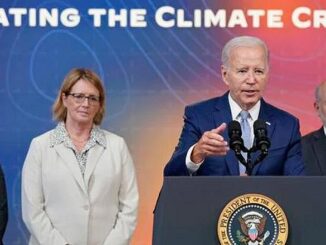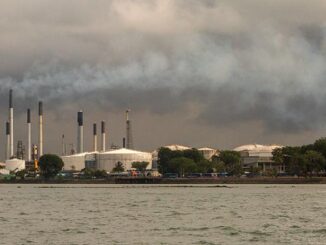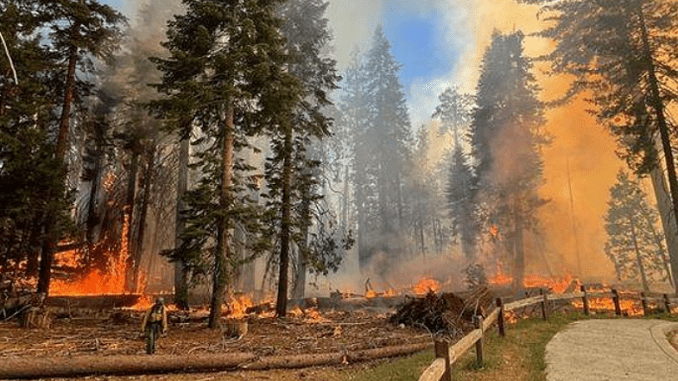
WASHINGTON, DC, July 20, 2022 (ENS) – Senator Joe Manchin of the coal-producing state of West Virginia, a Democrat, has told Democratic congressional leaders that he won’t support new climate spending or tax hikes on the wealthy, effectively scuttling President Joe Biden’s climate action agenda.
Manchin exercises power as chairman of the Senate Energy and Natural Resources Committee. During the ongoing budget negotiations his reluctance to meet the climate emergency has frustrated and outraged many Democrats. They note Open Secrets reporting that Senator Manchin leads all Members of Congress in accepting donations from fossil-fuel energy and mining companies.
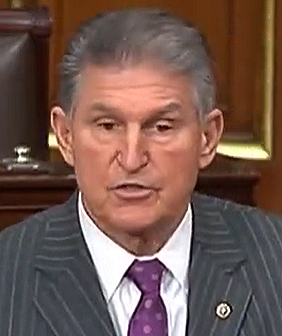
Manchin’s decision Thursday comes after months of negotiations with other members of Congress, and seven months after he rejected the original $2 trillion Build Back Better Act, which President Biden had approved.
A single senator has such power because the 100-member U.S. Senate is evenly divided – 50 Democrats and 50 Republicans – with any tie vote to be decided by Vice President Kamala Harris in her role as President of the Senate.
Without Manchin’s vote, the Democrats cannot move ahead on climate action funding, since they need the votes of all 50 Democratic senators, plus Vice President Harris’s tiebreaker, to use the budget reconciliation process to overcome Republicans’ expected filibuster of the legislation.
On Friday morning, Manchin told West Virginia radio talk show host Hoppy Kercheval that he could support climate spending and tax increases, but only if economic indicators improve in the next month. Manchin expressed concern about inflation as justification for his position. But another influencing factor is the funding he receives from the fossil fuel industry
“I’m not going to sugarcoat my disappointment here, especially since nearly all issues in the climate and energy space had been resolved,” said Senator Ron Wyden, an Oregon Democrat who chairs the Senate Finance Committee, which had helped write some of the budget bill.
“This is our last chance to prevent the most catastrophic – and costly – effects of climate change,” Wyden said in a statement. “We can’t come back in another decade and forestall hundreds of billions – if not trillions – in economic damage and undo the inevitable human toll.”
Lawmakers Urge Biden to Declare Climate Emergency
Nine senators today sent a letter to President Biden urging him to declare a climate emergency to unlock the “broad powers of the National Emergency Act.”
“For too long, we have been waiting for a single piece of legislation, and a single Senate vote, to take bold action on our climate crisis,” the senators wrote. “While we will continue to fight for whatever climate and clean energy proposals can pass in a divided Senate, Congressional action to address the climate crisis appears to have stalled.”
“As a result, we urge you to put us on an emergency footing and aggressively use your executive powers to address the climate crisis, create good-paying union jobs in the United States, and liberate hard-working American families from volatile energy prices. We ask that you start by declaring a climate emergency to unlock the broad powers of the National Emergency Act (NEA) and immediately pursue an array of regulatory and administrative actions to slash emissions, protect public health, support national and energy security, and improve our air and water quality,” they wrote.
“Declaring the climate crisis a national emergency under the NEA would unlock powers to rebuild a better economy with significant, concrete actions,” wrote the senators to Biden. “Under the NEA, you could redirect spending to build out renewable energy systems on military bases, implement large-scale clean transportation solutions and finance distributed energy projects to boost climate resiliency. All of these actions would employ Americans in new and emerging industries while securing American leadership in global markets.”
The senators wrote that declaring a national emergency is not something to take lightly, and noted their own apprehension of prior national emergencies, but state that tackling the climate crisis is an emergency that demands ambitious, urgent action.
In addition to calling for a national emergency, the senators ask the President to direct the Environment Protection Agency to develop a “bold array of rules to reduce carbon dioxide, methane, and other pollutants from coal- and gas-fired power plants, cars and light trucks, heavy-duty vehicles, and oil and gas facilities.”
The letter details needed work that other federal agencies can do to bring down the planetary temperature – now making itself felt as deadly heatwaves across the Northern Hemisphere.
For instance, the senators wrote, “Your Office of Management and Budget should forthwith promulgate an updated social cost of carbon and require its use throughout government decision-making, including in areas such as procurement and the determination of royalty rates where it can be particularly effective. Your Interior Department should move boldly to limit carbon pollution from fossil fuels produced on public lands and waters…”
“The climate crisis is one of the biggest emergencies that our country has ever faced and time is running out. We cannot allow a single senator to stall our progress. Addressing this crisis head-on, with the full authorities you possess is a win for the environment, public health, the planet, American workers, American consumers, and our national security interests. We urge you to act boldly, declare this crisis the national emergency that it is, and embark upon bold regulatory and administrative action,” the senators concluded.
The eight Democratic senators who signed the letter are: Edward Markey and Elizabeth Warren of Massachusetts, Cory Booker of New Jersey, Sheldon Whitehouse of Rhode Island, Brian Schatz of Hawaii, Martin Heinrich of New Mexico, Alex Padilla of California, and Jeff Merkley of Oregon. They were joined by Senator Bernie Sanders of Vermont, who identifies himself as an Independent and caucuses with the Democrats.
Full text of the letter is online here.
Biden Responds at Repurposed Coal-Fired Power Plant
To announce his immediate response to the critical situation precipitated by Senator Manchin’s lack of support for climate spending, President Biden today traveled to Brayton Point Power Station in Somerset, Massachusetts, the last and largest coal-fired power plant in the state, shuttered in 2017.
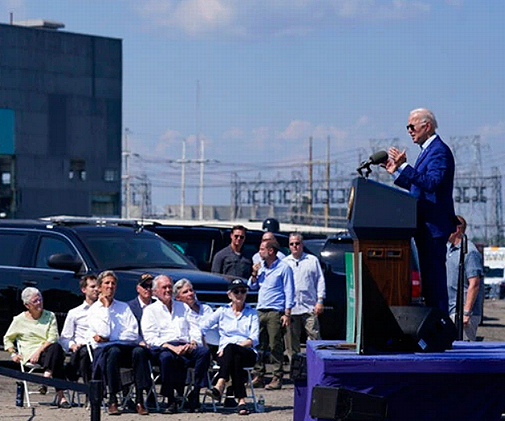
Biden told the crowd, which included Senators Markey, Warren, and Whitehouse, and Special Presidential Envoy for Climate John Kerry, as well as National Climate Advisor to the President Gina McCarthy. that even where fossil fuel-powered plants like Brayton Point are retired, they still have a role in powering the future.
The Brayton Point plant, like many others around the country, had a legacy of toxins, smog, greenhouse gas emissions, the kind of pollution that contributed to the climate emergency we now face today, Biden explained.
But life is changing at Brayton Point. In the near future, on the site of the coal-fired power plant, 248 miles of high-tech, heavy-duty subsea cables will be manufactured to connect offshore wind farms to the existing power grid. Manufacturing these cables will mean good-paying jobs for 250 workers, as many workers as the old power plant had at its peak, Biden said.
The port at Brayton Point was used to move coal into the power plant. Now it will be used to carry components for offshore wind power out to sea to install the almost 100 wind turbines going up off the coasts of Massachusetts and Rhode Island. The ground has been broken for these offshore wind projects and work is underway.
“The converter station here and the substation nearby will now move clean electricity generated offshore by the wind – (applause) – enough power to power hundreds of thousands of homes onto the grid – putting old assets to work delivering clean energy. This didn’t happen by accident. It happened because we believed and invested in America’s innovation and ingenuity,” Biden said.
While he stopped short of declaring a climate emergency, Biden did acknowledge the devastating effects of climate change on the United States right now.
“Ravaging hundred-year-old droughts occurring every few years instead of every hundred years. Wildfires out west that have burned and destroyed more than five million acres – everything in its path. That is more land than the entire state of New Jersey, from New York down to the tip of Delaware. It’s amazing. Five million acres,” the President emphasized.
“Our national security is at stake as well. Extreme weather is already damaging our military installations here in the states. And our economy is at risk. So we have to act,” Biden declared.
“Extreme weather disrupts supply chains, causing delays and shortages for consumers and businesses,” he said. “Climate change is literally an existential threat to our nation and to the world.”
“So my message today is this,” Biden said. “Since Congress is not acting as it should – these guys here are, but we’re not getting many Republican votes – this is an emergency. An emergency. And I will look at it that way.”
Biden promied to use his presidential powers to combat climate change, without relying on Congress. “I said last week and I’ll say it again loud and clear: As President, I’ll use my executive powers to combat the climate crisis in the absence of congressional actions.”
In the coming days, Biden said his administration will announce “executive actions to combat this emergency.”
“We need to act,” he repeated.
Biden stressed that as he was speaking “100 million Americans are under heat alert – 100 million Americans. Ninety communities across America set records for high temperatures just this year, including here in New England.”
“Records have been set in the Arctic and the Antarctic, with temperatures that are just unbelievable, melting the permafrost. And it’s astounding the damage that’s being done,” Biden warned.
“This crisis impacts every aspect of our everyday life,” Biden declared. “That’s why today I’m making the largest investment ever – $2.3 billion – to help communities across the country build infrastructure that is designed to withstand the full range of disasters we’ve been seeing up to today – extreme heat, drought, flooding, hurricanes, tornadoes.”
Biden said his administration is “going to make sure that the ocean is open for the clean energy of our future.” He will direct Interior Secretary Deb Haaland to permit wind energy off the mid- and Southern Atlantic Coasts and Florida’s Gulf Coast, and announced that his administration will begin the process to develop offshore wind power in the Gulf of Mexico for the first time. The Gulf has been a hub for oil and gas production.
A White House fact sheet shows that the areas where it is proposing offshore wind development have the potential to power three million homes.
Environmental groups are disappointed once again in this congressional failure to rein in temperature-raising energy choices.
Dan Lashof, director, World Resources Institute United States, warned, “As wildfires burn in over 12 U.S. states and much of the country faces sweltering heat waves, the public is demanding America do more, not less, to address the climate crisis.”
“Senator Manchin’s claim that the climate provisions in this package would contribute to inflation is misguided. Research shows that clean energy measures would save American households $500 annually in energy bills,” said Lashof.
“Failure to enact a climate-smart budget package would be a devastating setback to achieving the United States’ pledge to cut emissions in half by 2030. WRI’s research shows that strong financial investments, like those under consideration in the budget reconciliation package, are essential for the U.S. to achieve that timeline.”
At the Natural Resources Defense Council, John Bowman, managing director of government affairs, likes the way Biden is looking out for vulnerable communities. “The president is taking urgently needed action to protect our workers and communities from the mounting dangers and rising costs of the widening climate crisis. This is an essential investment in public health and safety. It’s especially important for low-income communities and people of color suffering inordinate harm on the front lines of blistering heat, withering drought and raging wildfires, storms and floods.”
“Today’s action also advances a key part of the solution, tapping into the vast potential for clean, renewable power from offshore wind turbines,” Bowman said, calling on Congress to pass clean energy incentives, and calling on Biden to ensure “every part of the government is part of the climate fix – not the problem.”
“That means implementing bipartisan infrastructure funding in a way that helps cut our carbon footprint, confront environmental injustice and ensure that low-income communities share equitably in the benefits of clean energy,” said Bowman.
“It means making sure our public lands and federal ocean waters help support clean energy, not lock us into a deepening dependence on fossil fuels. And it means writing rules to help clean up our cars, trucks and dirty power plants, make our homes and workplaces more efficient, and cut emissions of other dangerous greenhouse gases like methane,” the NRDC spokesman said. “The climate crisis is accelerating. So must our action, as a nation, to confront it.”
Featured image: Flames from the Washburn Fire are visible along roadways in Yosemite National Park. The fire has burned 4,856 Acres and is 58 percent contained. July 7, 2022 (Photo courtesy National Park Service via Inciweb)
© 2022, Environment News Service. All rights reserved. Content may be quoted only with proper attribution and a direct link to the original article. Full reproduction is prohibited.

